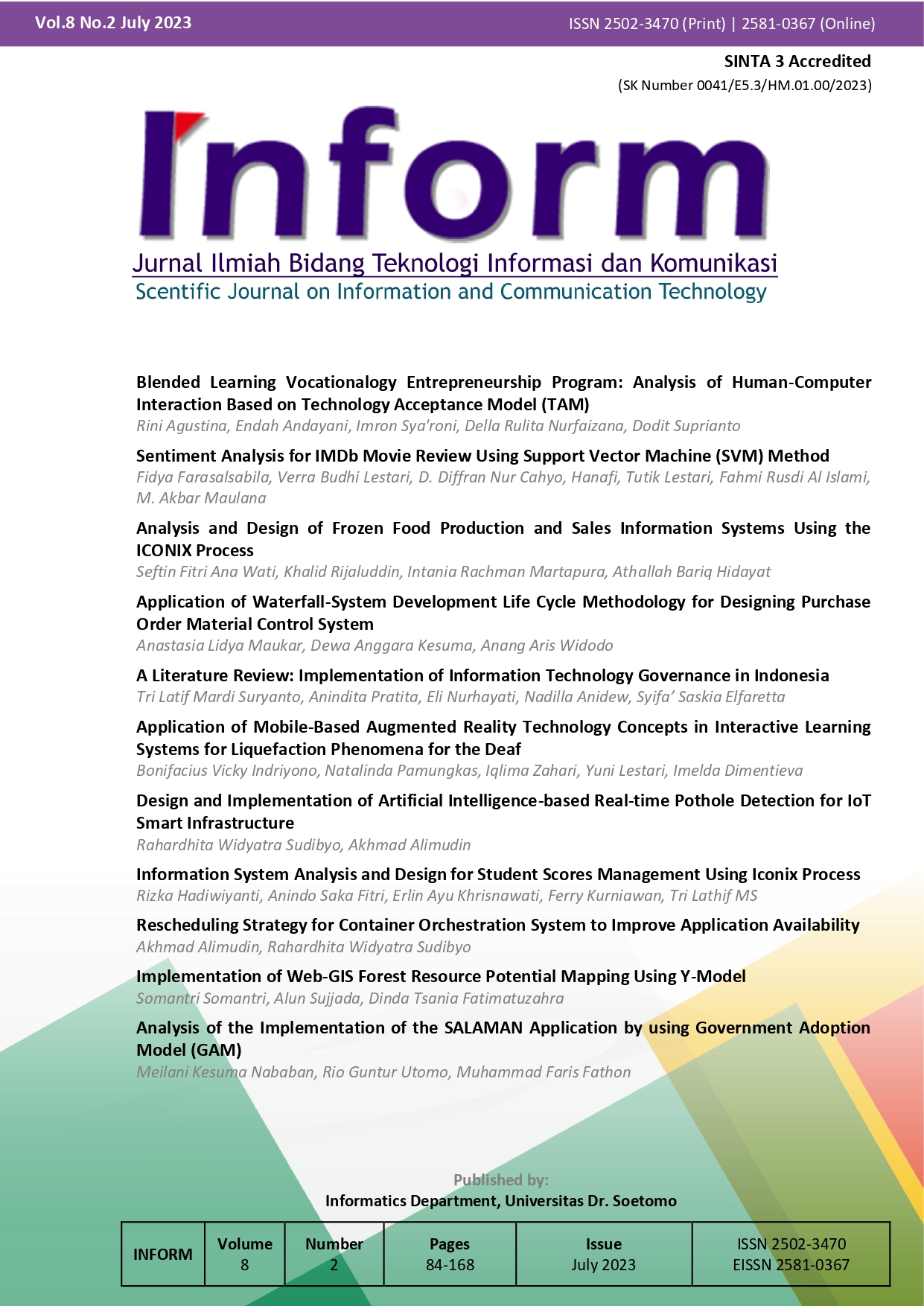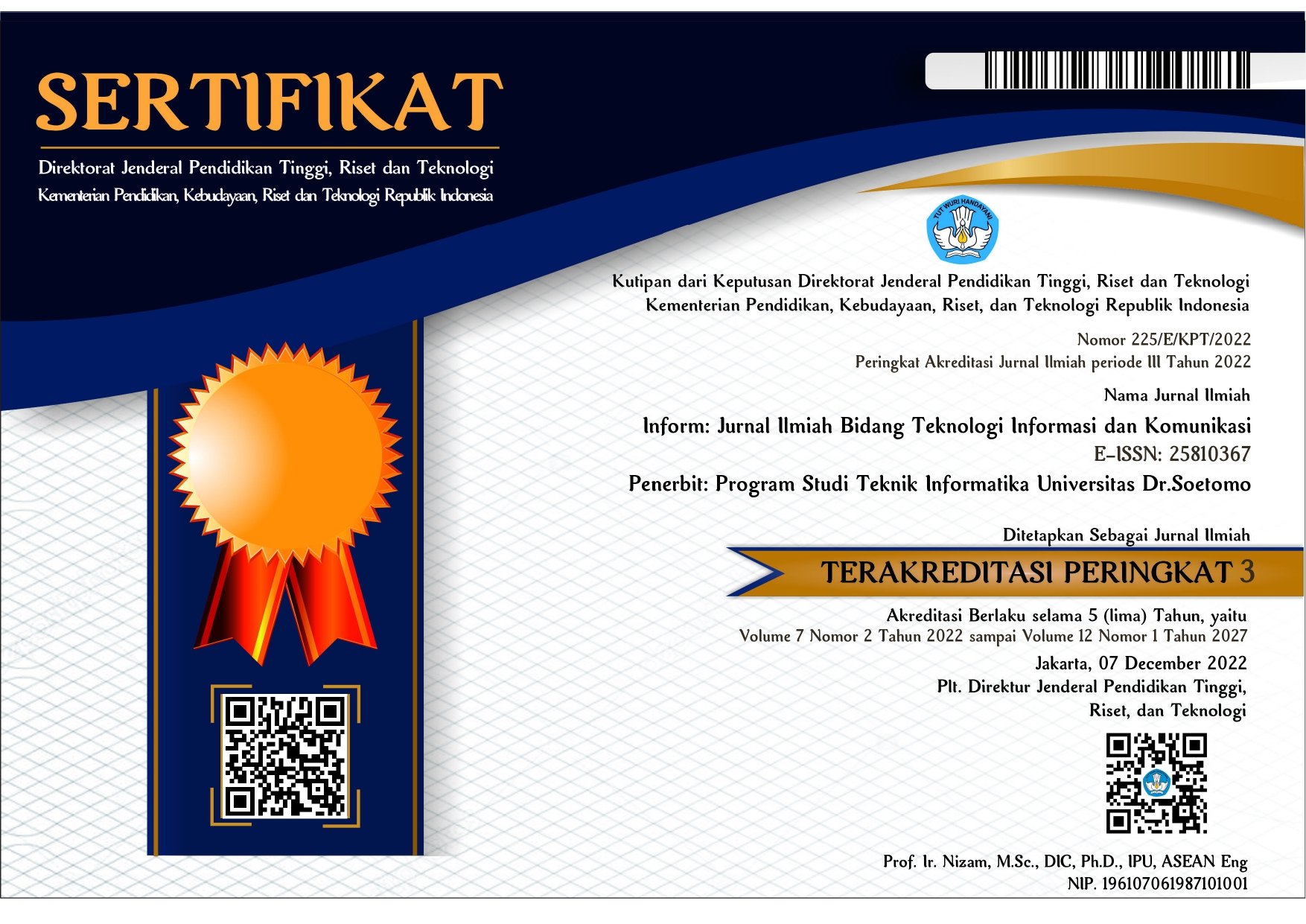Rescheduling Strategy for Container Orchestration System to Improve Application Availability
 Abstract views: 266
,
Abstract views: 266
,
 PDF downloads: 208
PDF downloads: 208
Abstract
Virtualization technologies such as containers have become increasingly popular and widely used today. Containers offer several advantages, such as flexibility, portability, and scalability. Container-supporting technologies such as container orchestration provide more advantages to container users to maintain the containers. One of the crucial features of container orchestration is the scheduler responsible for assigning containers to the proper server. However, container misplacement often occurs during the scheduling process, which may reduce the application's Quality of Service (QoS), such as availability. Multiple studies on scheduling strategies have been conducted with various goals, such as increasing application availability. To improve the application availability, we can reschedule the containers in the cluster. This study proposes a rescheduling strategy on the Kubernetes container orchestration system to improve the application available in the container. We use the probability approach as a solution for rescheduling actions in dynamic environments against containers that have an unhealthy state. Our experimental results show that our rescheduling strategy improves application availability compared with the Kubernetes default schedule. Rescheduling improves application availability according to experiments. After rescheduling, Kubernetes had a better application success rate. The chart demonstrates that the average success rate of applications for the threshold of 0.9 surpasses the other thresholds on average. In contrast, the availability of applications using the threshold 0f 0.7 is lower than the others. High thresholds improve application availability.
References
Z. Zhong and R. Buyya, "A cost-efficient container orchestration strategy in kubernetes-based cloud computing infrastructures with heterogeneous resources," ACM Transactions on Internet Technology (TOIT), vol.20, no.2, pp.1–24, 2020.
A. Alimudin and Y. Ishida, "Service-based container deployment on kubernetes using stable marriage problem," Proceedings of the 2020 The 6th International Conference on Frontiers of Educational Technologies, pp.164–167, 2020.
A. Alimudin and Y. Ishida, "Dynamic assignment based on a probabilistic matching: Application to server-container assignment," Procedia Computer Science, vol.176, pp.3863–3872, 2020.
D. Gusfield and R.W. Irving, The stable marriage problem: structure and algorithms, MIT press, 1989.
C. Kaewkasi and K. Chuenmuneewong, "Improvement of container scheduling for docker using ant colony optimization," 2017 9th international conference on knowledge and smart technology (KST), pp.254–259, IEEE, 2017.
F. Chen, X. Zhou, and C. Shi, "The container deployment strategy based on stable matching," 2019 IEEE 4th International Conference on Cloud Computing and Big Data Analysis (ICCCBDA), pp.215– 221, IEEE, 2019.
C. Cérin, T. Menouer, W. Saad, and W.B. Abdallah, "A new docker swarm scheduling strategy," 2017 IEEE 7th international symposium on cloud and service computing (SC2), pp.112–117, IEEE, 2017.
T. Menouer, "Kcss: Kubernetes container scheduling strategy," The Journal of Supercomputing, pp.1–27, 2020.
M. Rodriguez and R. Buyya, "Container orchestration with costefficientautoscalingincloudcomputingenvironments," inHandbook of research on multimedia cyber security, pp.190–213, IGI Global, 2020.
H. Xu and B. Li, "Egalitarian stable matching for vm migration in cloud computing," 2011 IEEE Conference on Computer Communications Workshops (INFOCOM WKSHPS), pp.631–636, IEEE, 2011.
B. Di Martino, G. Cretella, and A. Esposito, "Advances in applications portability and services interoperability among multiple clouds," IEEE Cloud Computing, vol.2, no.2, pp.22–28, 2015.
A. Verma, L. Pedrosa, M. Korupolu, D. Oppenheimer, E. Tune, and J. Wilkes, "Large-scale cluster management at google with borg," Proceedings of the Tenth European Conference on Computer Systems, pp.1–17, 2015.
Kubernetes, "Kubernetes components." https://kubernetes.io/docs/ concepts/overview/components. Accessed: 2021-02-21.
Kubernetes, "Kubernetes scheduler." https://kubernetes.io/docs/ concepts/scheduling-eviction/kube-scheduler/. Accessed: 2021-0221.
D. Gale and L.S. Shapley, "College admissions and the stability of marriage," The American Mathematical Monthly, vol.69, no.1, pp.9–15, 1962.
Y. Ishida and K.I. Tanabe, "Network rewiring in self-repairing network: from node repair to link rewire," 17th International Symposium on Artificial Life and Robotics, 2012.
Kubernetes, "Configure liveness, readiness and startup probes." https://kubernetes.io/docs/tasks/configure-pod-container/configureliveness-readiness-startup-probes/. Accessed: 2021-02-21.
NRMP, "The match, national resident matching program." https: //www.nrmp.org/. Accessed: 2021-02-21.
A. Kella and G. Belalem, "Vm live migration algorithm based on stable matching model to improve energy consumption and quality of service.," CLOSER, pp.118–128, 2014.
X. Fan, W.D. Weber, and L.A. Barroso, "Power provisioning for a warehouse-sized computer," ACM SIGARCH computer architecture news, vol.35, no.2, pp.13–23, 2007.
D. Kusic, J.O. Kephart, J.E. Hanson, N. Kandasamy, and G. Jiang, "Power and performance management of virtualized computing environments via lookahead control," Cluster computing, vol.12, no.1, pp.1–15, 2009.
R. Sinha, N. Purohit, and H. Diwanji, "Energy efficient dynamic integration of thresholds for migration at cloud data centers," IJCA Special Issue on Communication and Networks, vol.1, pp.44–49, 2011.
dockerhub, "Php arithmetic docker image." https://hub.docker.com/ r/alioke/hpafix.
Oracle, "Quality of service requirements." https://docs.oracle.com/ cd/E19636-01/819-2326/gaxqg/index.html. Accessed: 2021-02-21. [25] Github, "Vegeta load test." https://github.com/tsenart/vegeta.
Copyright (c) 2023 Akhmad Alimudin

This work is licensed under a Creative Commons Attribution-ShareAlike 4.0 International License.
Authors who publish with Inform: Jurnal Ilmiah Bidang Teknologi Informasi dan Komunikasi agree to the following terms:
-
Authors retain copyright and grant the journal right of first publication with the work simultaneously licensed under a Creative Commons Attribution License (CC BY-SA 4.0) that allows others to share the work with an acknowledgment of the work's authorship and initial publication in this journal.
-
Authors are able to enter into separate, additional contractual arrangements for the non-exclusive distribution of the journal's published version of the work (e.g., post it to an institutional repository or publish it in a book), with an acknowledgment of its initial publication in this journal.
-
Authors are permitted and encouraged to post their work online (e.g., in institutional repositories or on their website) prior to and during the submission process, as it can lead to productive exchanges, as well as earlier and greater citation of published work.













